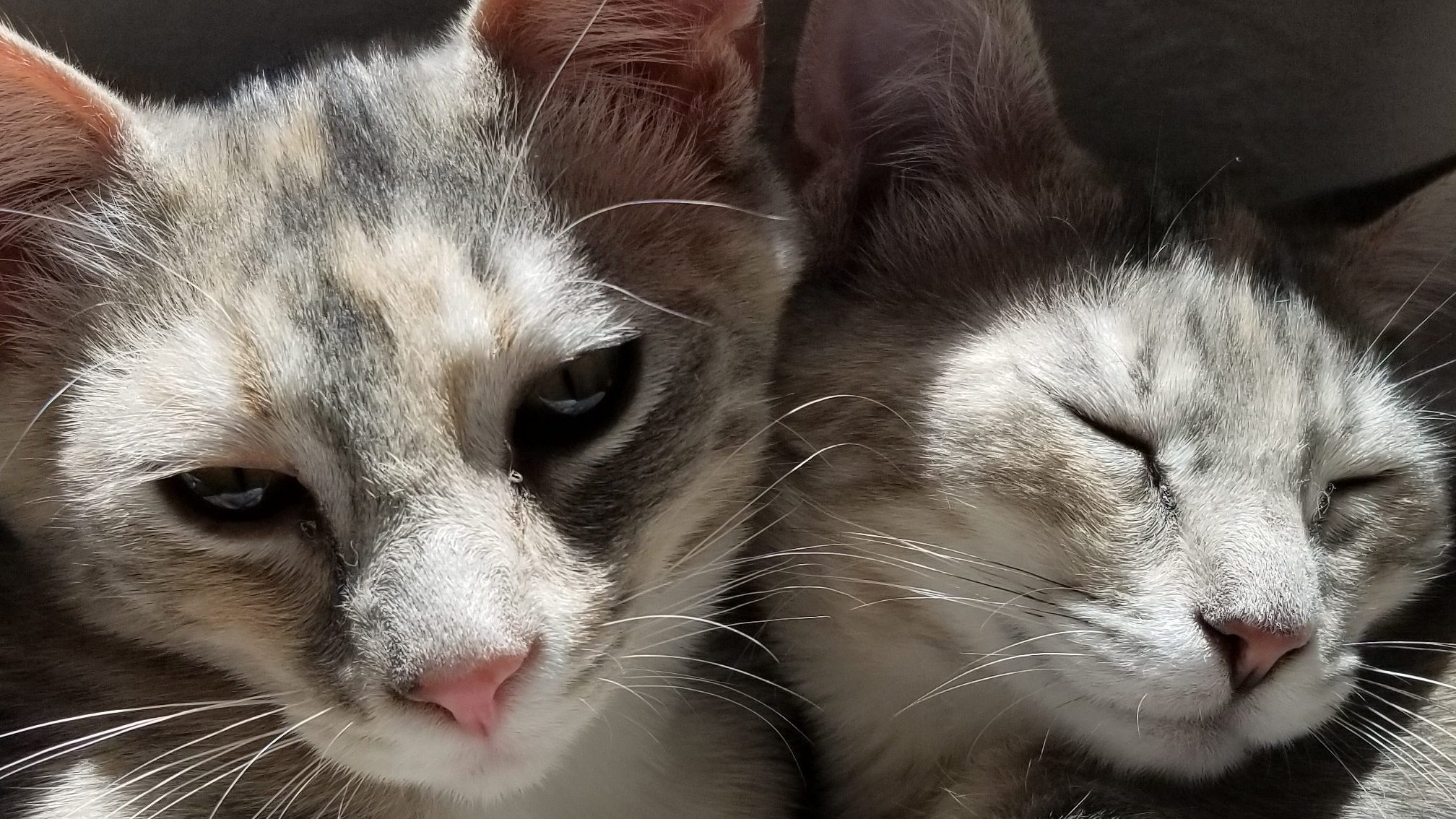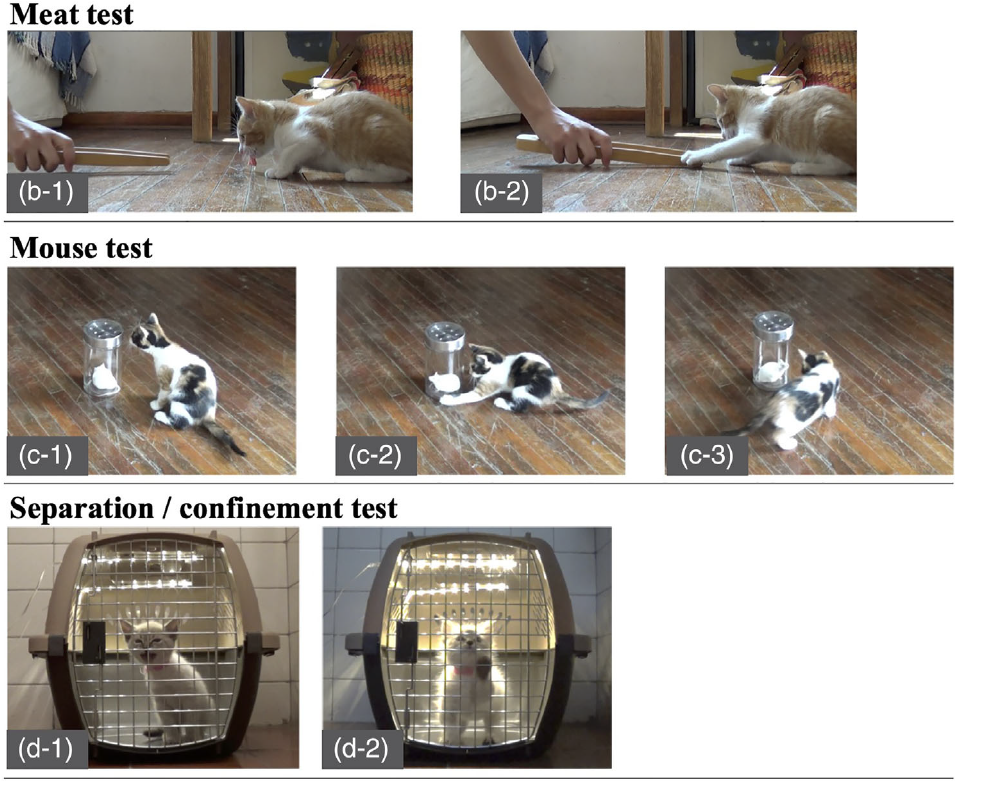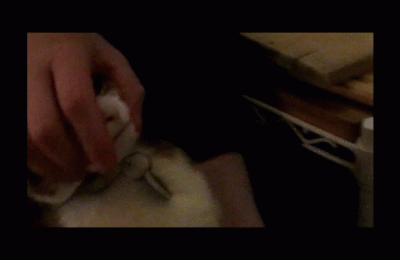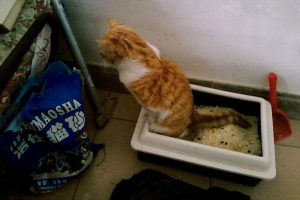Animal personality can be defined as consistency in behavior across different contexts (hey, that’s kind of how we define it in humans too). For example, if a cat is nervous compared to other cats when visitors come over, we might expect them to be more nervous at the veterinary clinic too.

Personality also helps us understand what other individuals are likely to do. When we know someone, human or feline, we can make reasonable predictions about how they might behave based on what they have done in the past.
If you were asked to describe your cat’s personality, you might use words like “needy”, “playful”, “shy”, “lazy”, or “independent.” But when did those qualities emerge? If you happened to have your cat when they were a kitten, you might be able to recall what they were like then. Some of us adopted our cats when they were older, and their personality was already a little more on the “gelled” side.
A previous study found that kittens showed consistent differences when separated from mom and litter mates – some kittens were more vocal and active than others at weeks 1 and 3. And another study found that kittens were consistent in how friendly they were toward humans at different points between 3 and 8 months of age. There has been a lot more research on adult cat personality, usually surveys of owners about their cat’s behavior. However, there’s been little research on the consistency of personality across time, and fewer studies of cat behaviors instead of surveys of owners.
New research, recently published in the journal Developmental Psychobiology, “Emergence of personality in weaning-age kittens of the domestic cat?”, looked at whether kittens would behave consistently when tested repeatedly in multiple contexts. By conducting five behavioral tests when kittens were 5, 6, and 7 weeks of age, researchers could determine if there were kitten consistencies across both situations and over time.
What the researchers did
The study involved 74 kittens (36 females and 38 males) from 16 different litters from a free-ranging colony of cats that live in a researcher’s home in Mexico (um, NOW you want to be a scientist, don’t you?). Kittens were housed with their mothers, and at four weeks of age, were provided with access to food, scratching posts, litter boxes, and other “enrichment.” Mother cats could come and go as they pleased. The kittens were all spayed/neutered and adopted out at the end of the study.
Starting at five weeks of age, kittens were given five tests of their responses to:
- being handled
- having food (raw meat) taken away
- seeing a mouse in a jar *
- being alone in a carrier for two minutes
- strange human approach
(*in case you are worried about the mice, they were a captive breed known to be less scared of predators, and were adopted by students at the end of the study. During the study, the mice were housed in a home environment)
These tests were identical to ones that the same researchers had conducted on adult cats in a separate study, which found stable differences between individuals, as well as relationships between certain tests (for example, adult cats who were more interested in the mouse were also more active when confined alone in a carrier).
Kittens received one test per day, and there was a week between each repeated test (for example, kittens receiving the mouse test on Monday, would receive their second mouse test the following Monday).

Kittens received different scores for different tests:
- Handling test: How long it took them to struggle (known as latency)
- Food removal test: Did they defend the meat or try to carry it away
- Mouse test: Did they get close to the jar? Did they sniff or circle it?
- Separation test: Did the kitten meow or move around in the carrier?
- Human approach test: Did the kitten approach the unfamiliar human? Did they touch their nose to an outstretched finger? How did they respond to petting?
What the researchers found
Results found some “modest” consistencies in kittens, with the strongest relationship being the number of times each kitten meowed during the three times they were confined in the carrier alone. The mouse test was the only one that did not show consistency across kittens when they were 5, 6, or 7 weeks old.
None of the test results were related to each other – meaning that the number of times a kitten meowed when alone was not predictive of their interest in mice, or humans, or meat.
In contrast to the studies in adult cats, the consistency in kitten behavior that we like to call personality was weaker. Evidence of personality was present, but it wasn’t very strong. It is possible that at this age, kittens are still learning and processing from life experiences (of which they haven’t had very many), and that like most good things, personality may take a bit of time to develop.
As other studies have shown more consistency in cat behavior between two months of age up to almost three years old, it is not that kittens don’t have personality. However, understanding some aspects of kitten behavior at 5 weeks may go only so far in helping us predict what they will be like as an adult cat.
References
Hudson, R., Chacha, J., Bánszegi,O., Szenczi, P., & Rödel,H. G. (2017).Highly stable individual differences in the emission of separation calls during early development in the domestic cat. Developmental Psychobiology, 59, 367–374
Lowe, S. E., & Bradshaw, J.W. S. (2002). Responses of pet cats to being held by an unfamiliar person, from weaning to three years of age. Anthrozoös,15, 69–79.
Martínez-Byer, S., Urrutia, A., Szenczi, P., Hudson, R., & Bánszegi, O. (2020). Evidence for individual differences in behaviour and for behavioural syndromes in adult shelter cats. Animals, 10, 1–15.
Turner, D. C., Feaver, J., Mendl, M., & Bateson, P. (1986). Variation in domestic cat behaviour towards humans: A paternal effect. Animal Behaviour, 34, 1890–1892.
Urrutia, A., Bánszegi, O., Szenczi, P., & Hudson, R. (2022). Emergence of personality in weaning‐age kittens of the domestic cat?. Developmental Psychobiology, 64(5), e22281.



One thought on “Do kittens have purr-sonality?”